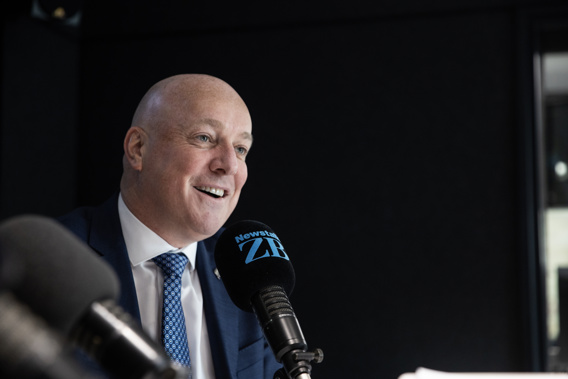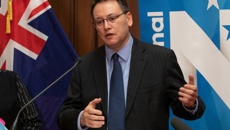
Many stories about Prime Minister-elect Christopher Luxon mention his leadership of Air New Zealand, but few consider the influence of his long career with Unilever, the Anglo-Dutch multinational and what that predicts about the calibre and style of his leadership.
Some critics have even mocked his consumer goods career referring to him as a “soap salesman”. Reporting on the election The Guardian evoked images of him working at a local dairy by describing his major global career bluntly as “he sold deodorant and soap”.
Either they don’t get his experience or it’s an attempt to diminish its value, but put another way, you don’t become President of Unilever Canada by winning the job in a raffle.
Having worked with Unilever people and other multinationals for more than a decade while CEO of the Food & Grocery Council, here’s why I think that his Unilever DNA is a powerful asset for political management and success.
The consumer goods multinationals are world-renowned for their investment in people. They are amongst the best in the world for training talent in every facet of management and leadership throughout a career, not just in the beginning as new graduates but in every phase thereafter.
Their investment starts early. The Unilever Future Leaders’ programme for hiring and growing young talent is one of the best, and Christopher Luxon will have enjoyed the full benefit of this training throughout his career. In the 90s the multinational graduate programmes were a major opportunity for young Kiwis and a massive investment in New Zealand’s human capital. At that time the global food and grocery companies still had a major footprint locally. Every year they would roll into New Zealand universities and hire hundreds of the best graduates. Many senior New Zealand leaders in the private and public sector today benefited from the first foot on the career ladder thanks to the cadet programmes of Procter & Gamble, Nestle, Glaxo, Heinz, Kellogg, L’Oreal, Cadbury, Colgate, and Unilever.
However, as factories closed in the last twenty years, including Unilever’s Petone soap powder factory, and the trend of consolidating Australasian markets continued, many of these cadet programmes are mere shadows of what they once were.
When Christopher Luxon was hired into Unilever it was a local major manufacturing powerhouse. Cadets would follow a rotation through different parts of the business from marketing, sales, finance to supply chain management and every aspect of the business. This makes him our first Prime Minister with a first-hand understanding of large-scale manufacturing and its vital place in our economy.
The graduate programmes were highly competitive, but those who did well were given opportunities to serve the company globally, a transformative opportunity for young Kiwis.
Working internationally within any major organisational network has a big impact on an individual, their career trajectory and perspective. Knowledge of the world beyond New Zealand is important to any political leader. It gives confidence and lifts a leader’s horizons beyond the potential trap of petty politics that can often befall a small country, the size of many global cities.
While MPs come to Parliament with a different basket of skills and experiences and there are different successful pathways to leadership, long-term service with a global company is valuable in a political context, particularly on becoming Prime Minister.
Here are 5 aspects to ‘The Unilever Way’ that I suspect influence his leadership today.
One, leadership values: It is no coincidence that Christopher Luxon often utters the word purpose. Being “purpose-driven” is the mantra of multinational leaders and executives.
In 1995 when Christopher Luxon had already progressed to being a Brand Manager for Australia and New Zealand, Unilever was one of the first multinationals to publish a “Code of Business Principles”. Such public statements are ubiquitous today, but at the time this was groundbreaking in terms of global companies becoming more transparent about their values and responsibilities. This ramped up considerably during the leadership of global CEO Paul Polman, Christopher Luxon’s boss from 2009-2011. During this time the company led the way for corporate peers on sustainability, business accountability and global advocacy for better ways of doing business.
This approach was applied to every aspect of the business. From food reformulation for health, sustainable sourcing of ingredients, the reduction in packaging waste, diversity and inclusion targets, and improving workers benefits, Unilever has been an early adopter of all socially responsible business practices. Environmental issues and how to practically respond for the benefit of the planet was not a new issue for Christopher Luxon upon entering Parliament.
Two, negotiation skills. While some commentators suggest that “Luxon doesn’t have the nous to negotiate with Peters”, this will be proven wrong. His Unilever experience guarantees his understanding of respectful and successful negotiations that build long-term partnerships. As President and CEO of Unilever Canada, he would have been involved in, or responsible for, hundreds of high-stakes negotiations with a wide range of opponents, including Canadian supermarket giant Loblaw, known worldwide in grocery circles as being one of the most hardcore negotiators on the planet. The lifeblood of the entire consumer goods industry is negotiation, so they train, refresh and train again. Mediocre negotiators do not last long at Unilever.
Politics is different, but many negotiating principles remain the same: negotiating in good faith, looking for win-wins, focusing on areas of agreement, demonstrating mutual respect, constructing the appropriate negotiating team, understanding the opponents’ ambitions and, particularly important in politics, investing in the post-negotiation relationship. The Unilever aim is always to build long term partnerships not to have one-off negotiations that falter over time.
Three, people management: Many MPs on entering parliament have never managed a team and this tripped up some Ministers in the last government. Christopher Luxon has managed and led high performing teams for nearly 30 years. There are differences between Parliament and the outside world, but corporates like caucuses contain the same egos and personalities. At Unilever, he will have worked with many hundreds of people he could command through line management and many others he could only influence.
You don’t get to lead a 500-strong team in a global multinational by being a lacklustre people leader. Even if he does not go full-noise-Unilever and implement formal KPIs (key performance indicators), performance targets and annual reviews, I predict he will still run the same thought processes in his head. Ministers and the public service should assume high expectations and perform accordingly.
Four, strategic planning and management: Few organisations ever reach the level of multinational strategic planning and implementation. It’s sophisticated and detailed. Ministers in the last government fell into the trap of announcing policies with positive fanfare and assumed that implementation by the public service would immediately follow without the need for ongoing management and monitoring.
Kiwibuild’s 100,000 houses, Auckland’s light rail and Dunedin Hospital are just three examples where implementation did not match the hype. In contrast, multinationals announce nothing without having the full implementation plan locked down, deliverable and monitored for performance. As President of Unilever Canada, he will have planned and overseen many such projects and held executives to account for delivery. He will expect new ministers to deliver on any announcements the government makes with consequences if they do not.
Five, marketing, branding, and communications: Jacinda Ardern’s communication degree was an asset as Prime Minister, but Christopher Luxon’s training is next level. He is the most trained, experienced mass-market communicator to become Prime Minister. His in-depth knowledge comes from executing global campaigns and communicating with consumers through disciplined public relations messages.
One term as an MP will have taught political nuance, but the bulk of these skills will have come from his nearly two decades of consumer goods marketing. He now talks to voters not consumers, about policies not products, but the skills and methods have a lot in common. What some interpret as being “too bland” is just consumer goods campaign discipline of staying on message. Watch out any caucus member who does or says anything off-brand.
There are many other skills and experiences that contribute to political leadership, and no one MP is elected to Parliament perfectly formed. But opponents banking on Christopher Luxon being just a “soap salesman” will be disappointed. The values, management training and leadership needed to succeed globally in Unilever are valuable skills for leading a small country, particularly one that needs what the Prime Minister-elect describes as “turnaround job”.
Take your Radio, Podcasts and Music with you









